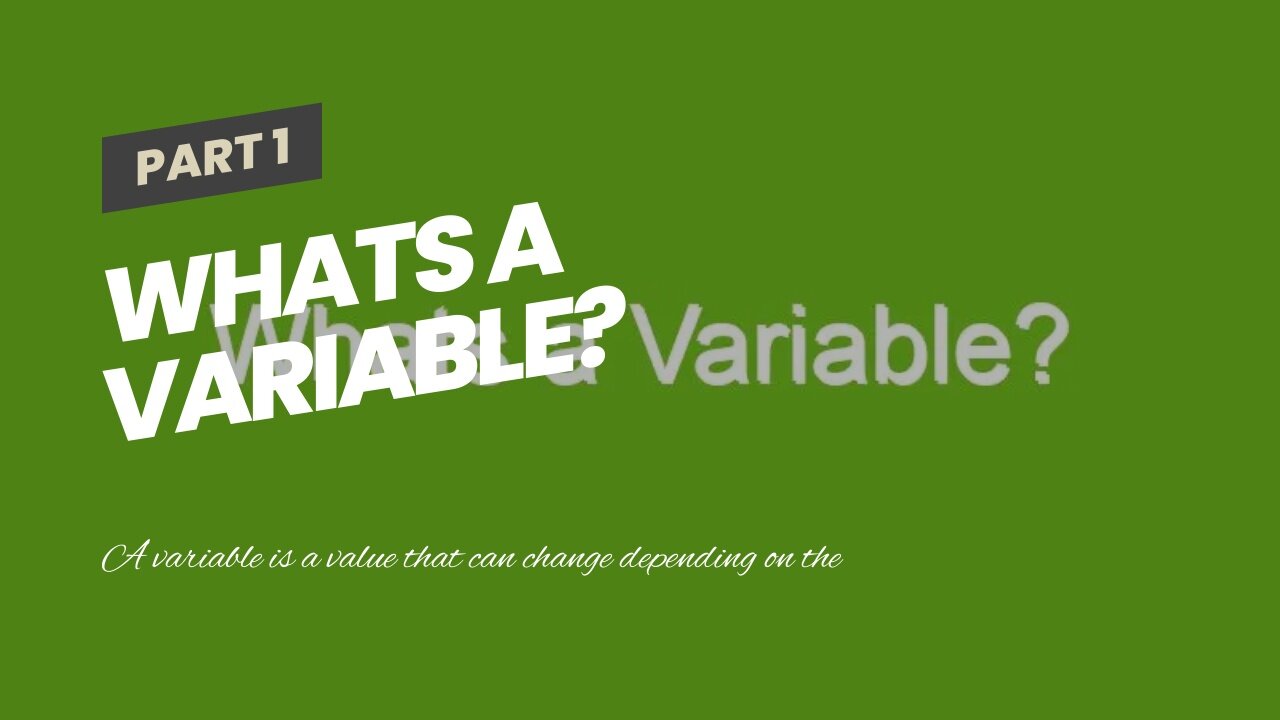Premium Only Content

Whats a Variable?
Whats a Variable?
A variable is a value that can change depending on the conditions or circumstances. In programming, variables are used to store data values. Variables can be of different data types, such as integers, floats, strings, and so on. There are two types of variables: global and local. Global variables are available throughout the program, while local variables are only available within the scope where they are declared. Using variables effectively can help you manage your data more efficiently and achieve your goals more easily. In this blog post, we will discuss what variables are, how to use them effectively, and...
https://finetimer.site/whats-a-variable/
A variable is a value that can change depending on the conditions or circumstances. In programming, variables are used to store data values. Variables can be of different data types, such as integers, floats, strings, and so on. There are two types of variables: global and local. Global variables are available throughout the program, while local variables are only available within the scope where they are declared. Using variables effectively can help you manage your data more efficiently and achieve your goals more easily. In this blog post, we will discuss what variables are, how to use them effectively, and why they are important. Photo by RODNAE Productions on Pexels What is a variable?
What are the different types of variables?
A variable is a named storage location that can hold values of various data types. The value stored in a variable can be changed during program execution. A variable can be declared by using the keyword var. For example,
var x int
The above code declares a variable x of type int. Once a variable is declared, it can be assigned a value of its data type. For example,
x = 10
The value 10 is now stored in the variable x. The value of a variable can be printed by using the fmt.Println() function. For example,
fmt.Println(x)
This would print the value 10 stored in the variable x.
Variables are classified into two categories: global and local variables. Global variables are those that are declared outside any function, while local variables are those that are declared inside a function. When a program is executed, all global variables are created first and then control is passed to the main() function where local variables come into existence.
How do you use variables?
What are some tips for using variables effectively?
When it comes to using variables effectively, there are a few key things to keep in mind. First, make sure you understand the different types of variables and how they can be used. Second, consider your objectives and how best to achieve them using variables. Lastly, remember that variables can be changed and updated as needed – so don’t be afraid to experiment!
Here are a few tips for using variables effectively:
– Get to know the different types of variables and how they can be used. This will help you choose the right type of variable for your needs.
– Consider your objectives and how best to achieve them using variables. What is your goal? What do you want to track or measure?
– Remember that variables can be changed and updated as needed. Don’t be afraid to experiment until you find a system that works best for you.
Why are variables important?
How can variables help you achieve your goals?
Variables are important because they allow you to store data that can be used later in your program. By storing data in a variable, you can easily access it and use it again without having to re-enter the data each time. This can save you a lot of time, especially if you need to use the same data several times.
For example, let’s say you’re writing a program that calculates the average temperature for a week. You could store the seven temperatures in seven different variables, then calculate the average by adding all seven temperatures together and dividing by seven. Or, you could store the temperatures in a single array variable, then use a loop to add all the temperatures together and calculate the average. The latter method would be much more efficient, since you wouldn’t have to create and manage seven different variables.
In addition to saving time, using variables can also help you avoid errors in your code. If you need to use the same value in several places throughout your code, it’s easy to make a mistake and use a different value than intended. By storing the value in a variable, you only have to change it...
-
 6:21
6:21
FineTimer
2 years agoHuobi Global: How to Get Ahead in the Digital World
4151 -
 2:14:13
2:14:13
FreshandFit
13 hours agoShe Was Given Extravagant Gifts And STILL Friendzoned Him +EXPOSED
188K36 -
 1:16:07
1:16:07
Man in America
11 hours agoOperation Gladio: The CIA, Mossad & City of London’s Plan for a New World Order
25.5K28 -
 2:11:41
2:11:41
Badlands Media
13 hours agoDEFCON ZERQ Ep. 016: Shadow Governments, Ancient Tech & the Spiritual War for Humanity
81.9K58 -
 2:09:24
2:09:24
Inverted World Live
7 hours agoRats Have Learned to Hunt Bats | Ep. 135
31.2K14 -
 2:48:01
2:48:01
TimcastIRL
8 hours agoLIVE Election Coverage: Polling Stations SWATTED, Bomb Threats Called In | Timcast IRL
254K177 -
 3:30:07
3:30:07
Barry Cunningham
8 hours agoBREAKING NEWS: COUNTDOWN TO COMMUNISM! ELECTION RESULTS SHOW!
59.5K47 -
 2:11:28
2:11:28
DeVory Darkins
7 hours agoLIVE NOW: 2025 Election results and Exit Polls AMA
70K46 -
 2:34:04
2:34:04
DLDAfterDark
6 hours ago $0.08 earnedJust Another Tuesday - In Virginia - The Governor's Race & Glock Talk
29.3K7 -
 3:21:38
3:21:38
The Charlie Kirk Show
9 hours agoJUDGMENT DAY 2025: The Election Results Stream
200K82